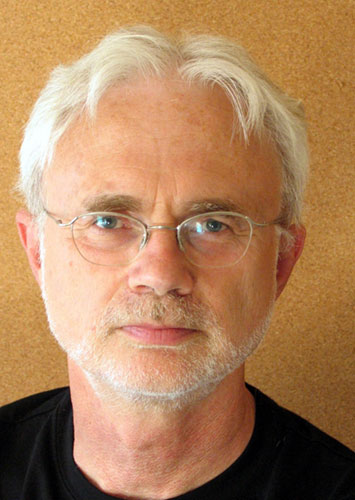
Pulitzer Prize-winning American composer John Adams (born 1947) has strong roots in minimalism. His best-known works include Short Ride in a Fast Machine (1986) and Shaker Loops (1978), a minimalist four-movement work for strings. His well-known operas include Nixon in China (1987), which recounts Richard Nixon's 1972 visit to China, and Doctor Atomic (2005), which covers Robert Oppenheimer, the Manhattan Project, and the building of the first atomic bomb.
Shaker Loops (for string septet) (1978): A "modular" composition for three violins, one viola, two cellos, and one bass, with a conductor. It is divided into four distinct movements, each of which grows almost indiscernibly into the next. Adams worked with a group of Conservatory string players, at times composing as they rehearsed. The "period" – that is, the number of beats per repeated pattern – of each instrument is different, and this results in a constantly shifting texture of melody and rhythmic emphasis. This piece is a turning point in Adams's oeuvre, as it marks a return to pure instrumental writing and a re-engagement with tonality. Adams later arranged this piece for string orchestra.
Harmonium for Large Orchestra and Chorus (1980–81): The piece starts with quietly insistent repetitions of one note – D – and one syllable – "no". The successful Harmonium premiere was the first performance of his music by a major mainstream organization, and established Adams as a figure in America's musical landscape.
Grand Pianola Music (1982): Adams commented, "Dueling pianos, cooing sirens, Valhalla brass, thwacking bass drums, gospel triads, and a Niagara of cascading flat keys all learned to cohabit as I wrote the piece." It is one of his first major works to incorporate American vernacular music within a classical symphonic tradition. Adams's use of the repetitive patterns of minimalism within sweeping orchestral gestures is heard throughout the piece.
Harmonielehre (1984–85): Inspired by a dream of an oil tanker taking flight out of San Francisco Bay and also by Arnold Schoenberg's book, Harmonielehre (Theory of Harmony). This piece is also about harmony of the mind and was Adams's way of escaping writer's block.
The Chairman Dances (Foxtrot for Orchestra) (1985): This is a by-product of Nixon in China, set in the three days of President Nixon's visit to Beijing in February 1972.
Short Ride in a Fast Machine (Fanfare for Great Woods) (1986): This piece is joyfully exuberant, brilliantly scored for a large orchestra. It begins with a marking of half-notes (woodblock, soon joined by the four trumpets) and eighths (clarinets and synthesizers); the (amplified) woodblock is fortissimo and the other instruments play forte. The work uses many elements of minimalist music.
John Adams: The Chairman Dances (1985), with images from the revolutionary Chinese ballet, The Red Detachment of Women. The ballet was used as inspiration for the third act dance scenes in Adams's opera, Nixon In China.
City of Birmingham Symphony Orchestra
Sir Simon Rattle, Conductor
/>
San Francisco Symphony Orchestra
Edo de Waart, Conductor
/>
John Adams: Grand Pianola Music (1982)
CalArts Contemporary Music Ensemble
Stephen Mosko, Conductor
/>
John Adams: Shaker Loops (1978, rev 1983)
Bournemouth Symphony Orchestra
Marin Alsop, Conductor
/>
John Adams: Short Ride in a Fast Machine (1986)
City of Birmingham Symphony Orchestra
Sir Simon Rattle, Conductor
/>
/>
John Adams: Harmonielehre (1985)
San Francisco Symphony Orchestra
Edo de Waart, Conductor
/>
/>
/>
/>
John Adams: Harmonium (1980)
San Francisco Symphony Orchestra and Chorus
Edo de Waart, Conductor
Negative Love or The Nothing
I never stoop’d so low, as they
Which on an eye, cheek, lip can prey.
Seldom to them, which soar no higher
Than virtue or the mind to admire.
For sense, and understanding may
Know what gives fuel to their fire:
My love, though silly, is more brave,
For may I miss, when’er I crave,
If I know yet, what I would have.
If that be simply perfectest
Which can by no way be express’d
But Negatives, my love is so.
To All, which all love, I say no.
If any who deciphers best,
What we know not, our selves, can know,
Let him teach me that nothing; this
As yet my ease and comfort is,
Though I speed not, I cannot miss.
– John Donne
/>
Because I could not stop for Death,
He kindly stopped for me;
The carriage held but just ourselves
And Immortality.
We slowly drove, he knew no haste,
And I put away
My labor, and my leisure too,
For his civility.
We passed the school where children played
At wrestling in a ring;
We passed the fields of gazing grain,
We passed the setting sun.
We paused before a house that seemed
A swelling of the ground:
The roof was scarcely visible,
The cornice but a mound.
Since then ‘tis centuries; but each
Feels shorter than the day
I first surmised the horses’ heads
Were toward eternity.
– Emily Dickinson
Wild Nights–Wild Nights!
Were I with thee
Wild Nights should be
Our Luxury!
Futile – the winds –
To a Heart in port –
Done with the Compass –
Done with the Chart!
Rowing in Eden –
Ah, the sea!
Might I but moor – Tonight –
In thee!
– Emily Dickinson
/>
請閱讀更多我的博客文章>>>